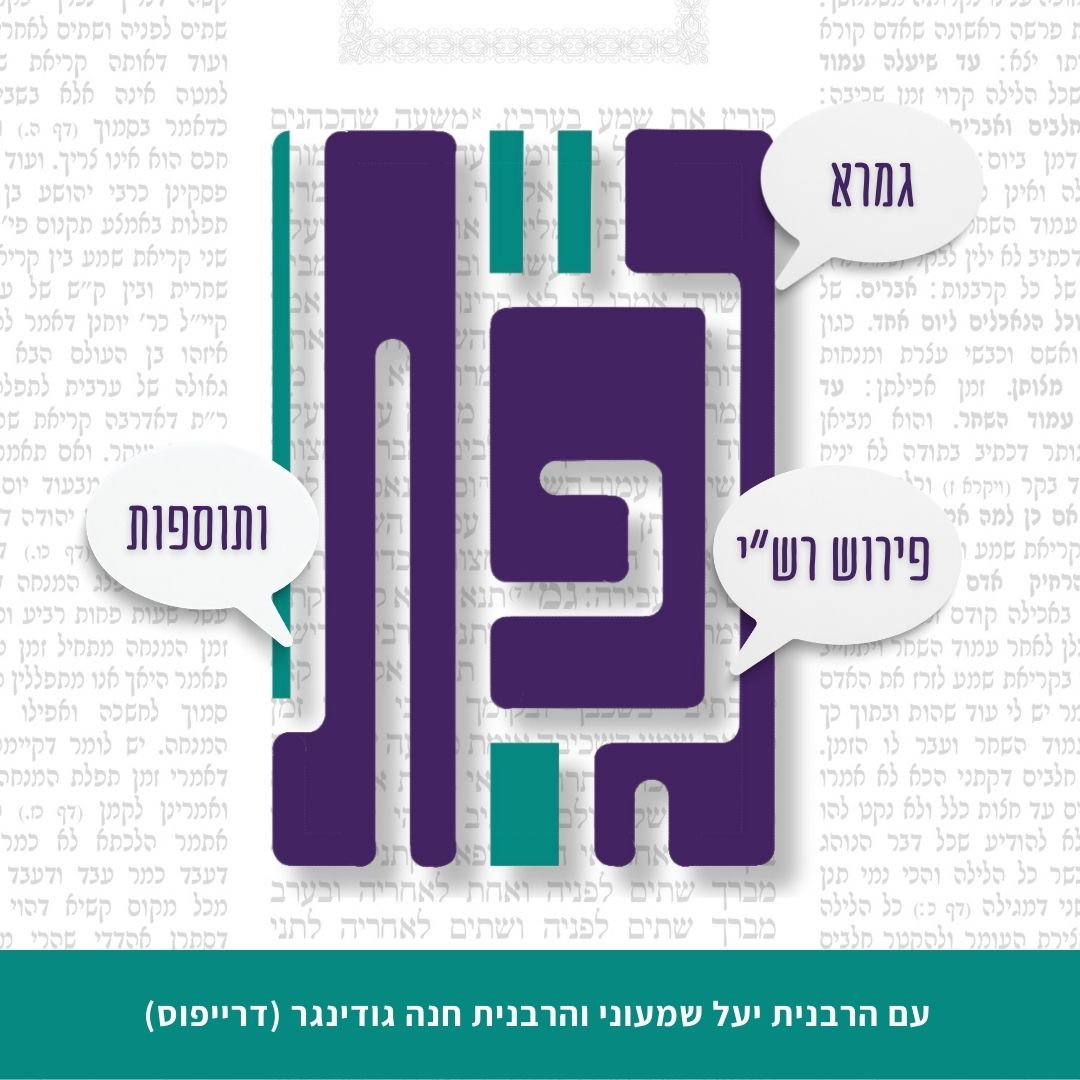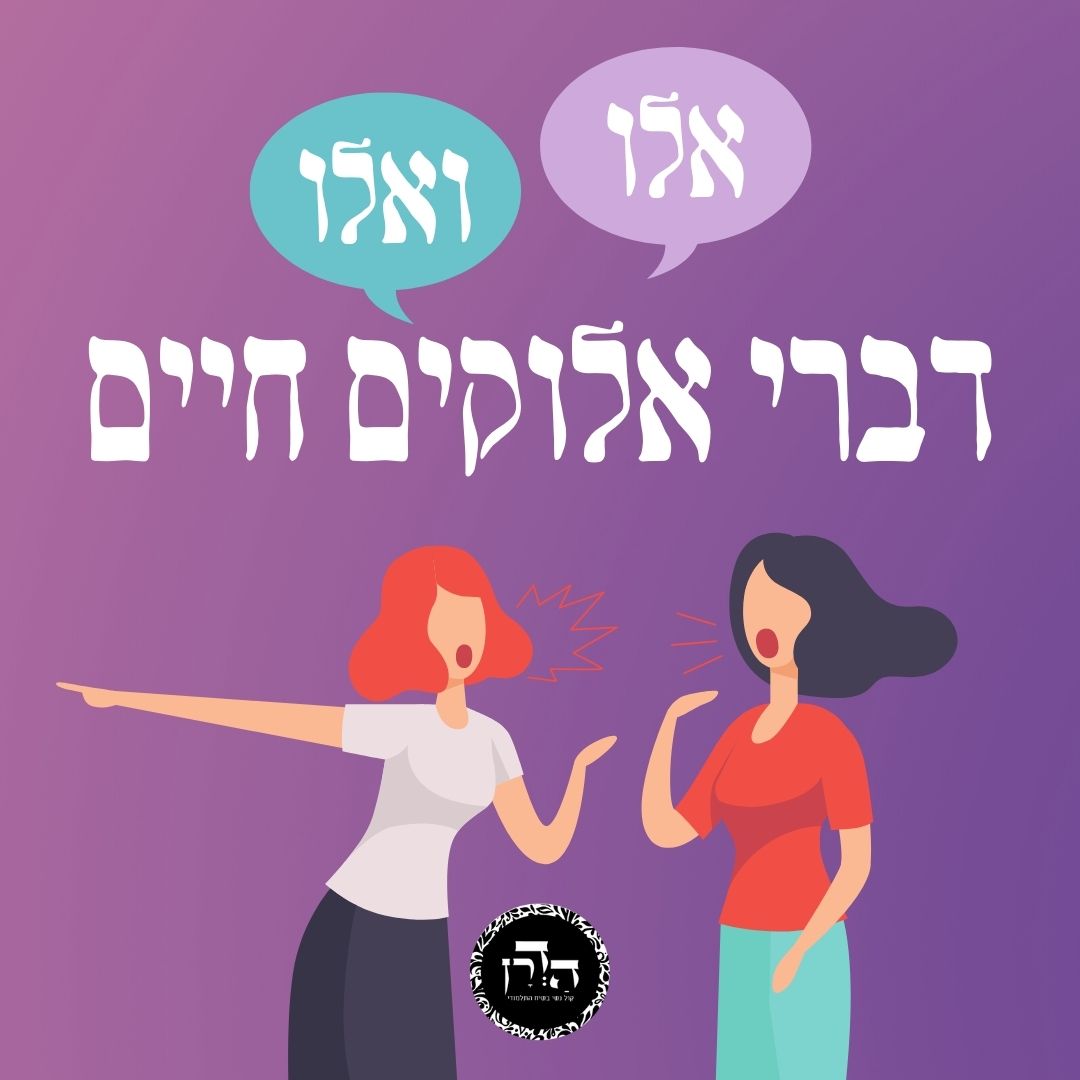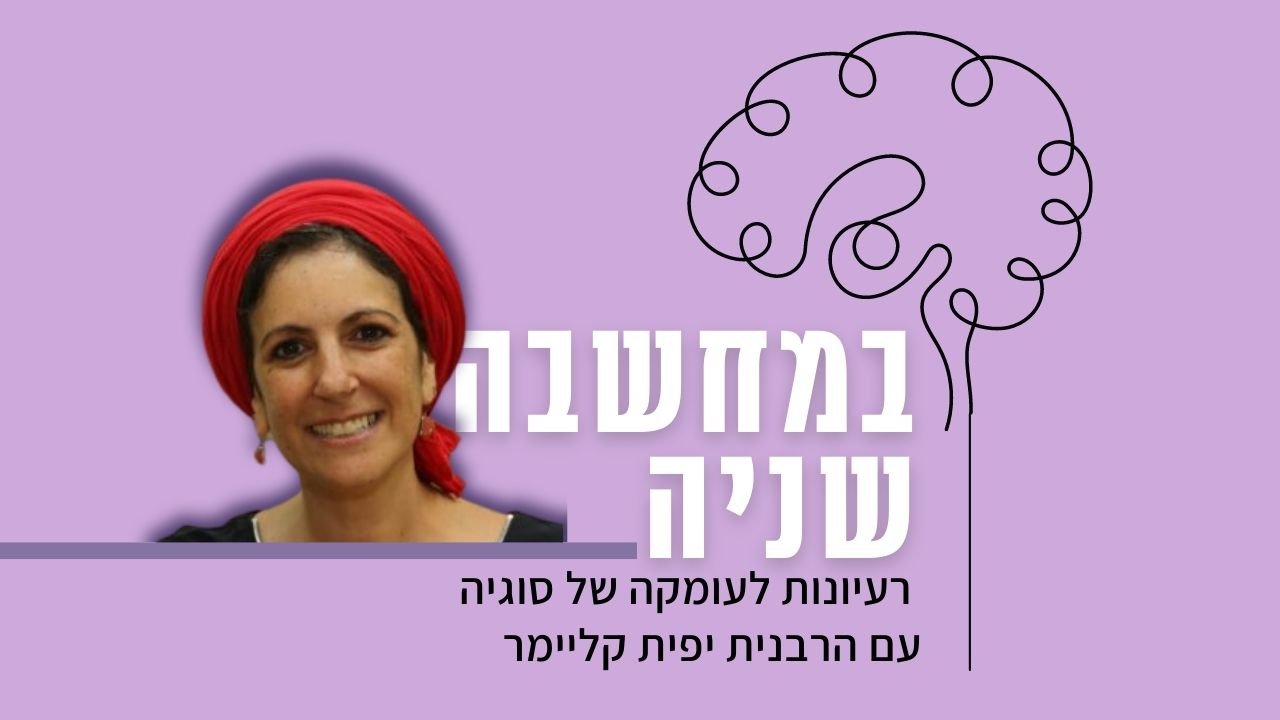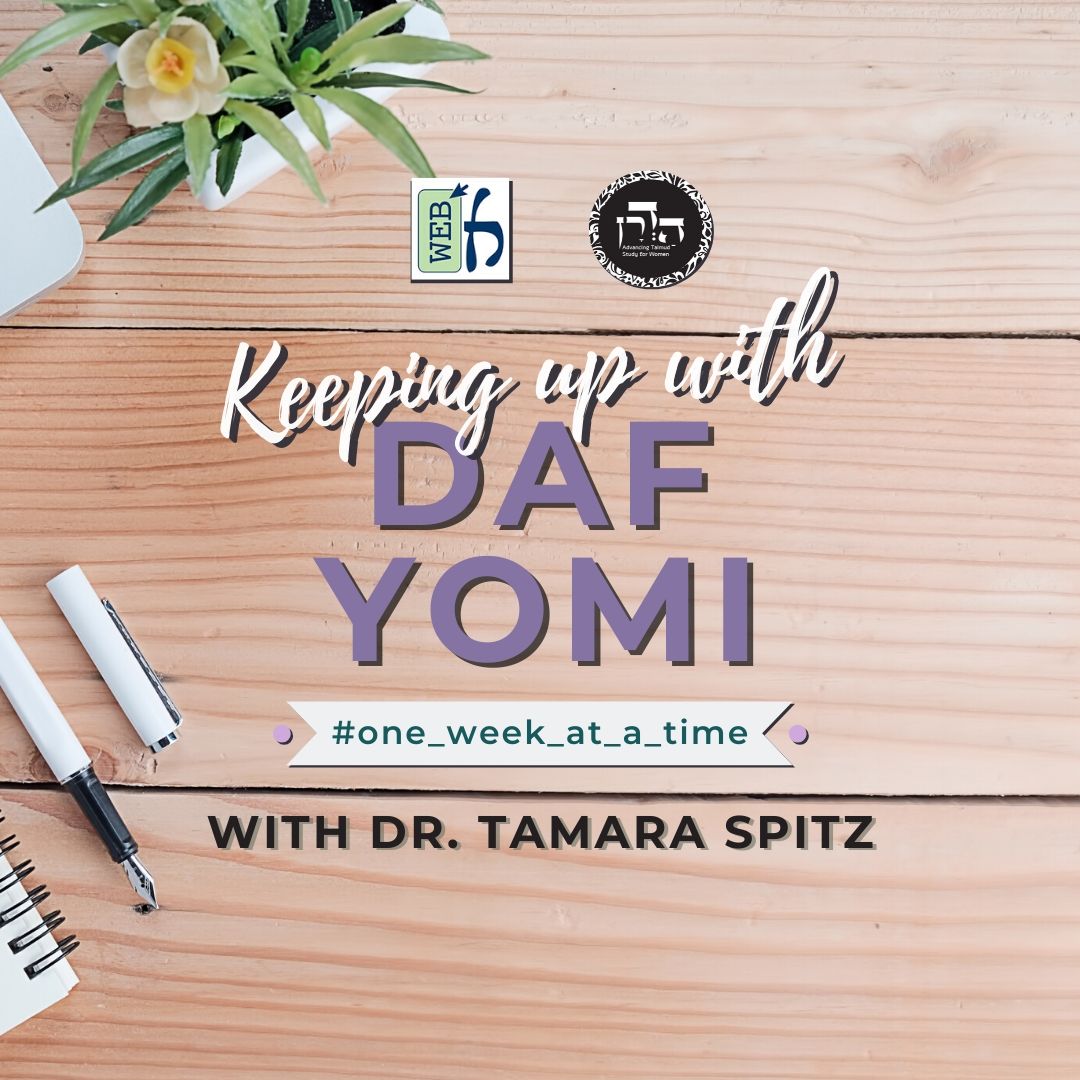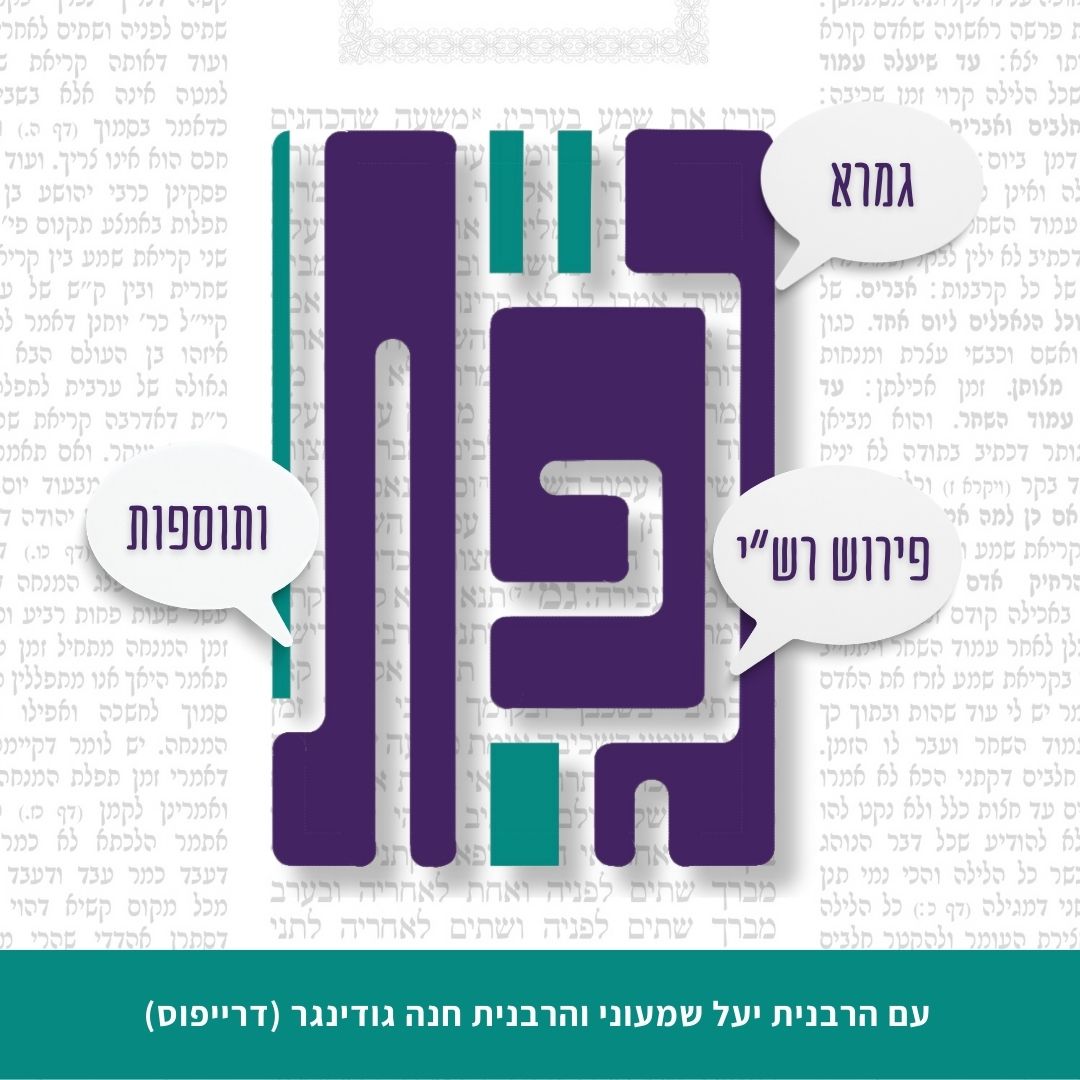אשה שרואה דם מחמת תשמיש – מה עושים? מה עושים לאשה שכל פעם שעולה מהמקוה וחוזרת הביתה מתחילה לדמם? רבי התקין תקנה בשדות בגלל שנשים לא ידעו להבחין בין דם נדה/דם זבה או בין צבעים – אם ראתה יום אחד או שניים מחכה עוד ששה ימים ואם ראתה שלושה יושבת שבעה נקיים. ר’ זירא (כמה דורות אחרי רבי) אמר שבנות ישראל החמירו על עצמן שתמיד יושבות שבעה נקיים אפילו אם ראו טיפת דם כחרדל. האם כולם קיבלו את החומרה? ששה הלכות מובאים בשם רבא (חמישה מתוכן בדף הזה). 1. דם חימוד – שבגללה צריכים שבעה נקיים לפני נישואין. 2. אי אפשר לחפוף לפני טבילה עם נתר או חול, שמא תהיה חציצה. 3. חייבים לחוף במים חמים ולא קרים. 4. צריך לנקות בית הקמטים ובית הסתרים – כי כל הראוי לבילה אין בילה מעכבת. 5. מה ההלכה אם לאחר הטבילה מוצאת חציצה – האם צריך לחשוש שהיה שם בטבילה – על פי מה קובעים?
רוצה להקדיש שיעור?
כלים
העמקה
רוצה להבין מה באמת קורה מתחת לפני השטח של הסוגיה?
שיעורים, פודקאסטים והרחבות של מיטב המורות שלנו יפתחו לך עוד זוויות וכיווני חשיבה.
חדשה בלימוד הגמרא?
זה הדף הראשון שלך? איזו התרגשות עצומה! יש לנו בדיוק את התכנים והכלים שיעזרו לך לעשות את הצעדים הראשונים ללמידה בקצב וברמה שלך, כך תוכלי להרגיש בנוח גם בתוך הסוגיות המורכבות ומאתגרות.
פסיפס הלומדות שלנו
גלי את קהילת הלומדות שלנו, מגוון נשים, רקעים וסיפורים. כולן חלק מתנועה ומסע מרגש ועוצמתי.
נדה סו
וְתִנָּשֵׂא לְאַחֵר.
and is married to another man. She is permitted to engage in intercourse with her second husband because it is possible that the bleeding was caused by engaging in intercourse with her first husband, and the issue will not reoccur when she engages in intercourse with a different man.
נִיסֵּת לְאַחֵר, וְרָאֲתָה דָּם מֵחֲמַת תַּשְׁמִישׁ — מְשַׁמֶּשֶׁת פַּעַם רִאשׁוֹנָה וּשְׁנִיָּה וּשְׁלִישִׁית, מִכָּאן וְאֵילָךְ לֹא תְּשַׁמֵּשׁ עַד שֶׁתִּתְגָּרֵשׁ וְתִנָּשֵׂא לְאַחֵר. נִיסֵּת לְאַחֵר, וְרָאֲתָה דָּם מֵחֲמַת תַּשְׁמִישׁ — מְשַׁמֶּשֶׁת פַּעַם רִאשׁוֹנָה וּשְׁנִיָּה וּשְׁלִישִׁית, מִכָּאן וְאֵילָךְ לֹא תְּשַׁמֵּשׁ עַד שֶׁתִּבְדּוֹק עַצְמָהּ.
If she married another man and again saw blood due to sexual intercourse, she may engage in intercourse before the first time this occurs, before the second time this occurs, and before the third time this occurs. From this point forward she may not engage in intercourse until she is divorced from her second husband and is married to yet another man. If she married another man and again saw blood due to sexual intercourse, she may engage in intercourse the first time this occurs, the second time this occurs, and the third time this occurs. From this point forward there is a presumption that she always bleeds due to engaging in intercourse, and therefore she may not engage in intercourse or marry someone else until she examines herself.
כֵּיצַד בּוֹדֶקֶת אֶת עַצְמָהּ? מְבִיאָה שְׁפוֹפֶרֶת, וּבְתוֹכָהּ מִכְחוֹל, וּמוֹךְ מוּנָּח עַל רֹאשׁוֹ. אִם נִמְצָא דָּם עַל רֹאשׁ הַמּוֹךְ — בְּיָדוּעַ שֶׁמִּן הַמָּקוֹר הוּא בָּא. לֹא נִמְצָא דָּם עַל רֹאשׁוֹ — בְּיָדוּעַ שֶׁמִּן הַצְּדָדִין הוּא בָּא.
How does she examine herself? She brings a tube, inside of which she places a cosmetic brush so that it is long enough to reach deeply into her vagina, and an absorbent cloth is placed on the tip of the brush. She inserts the tube with the brush and cloth within herself and then removes it. If blood is found on the top of the absorbent cloth, it is known that the blood comes from the uterus and she is ritually impure. If blood is not found on the top of the cloth, it is known that the blood comes from the sides of the vaginal walls and she is ritually pure, and she may resume engaging in intercourse with her husband.
וְאִם יֵשׁ לָהּ מַכָּה בְּאוֹתוֹ מָקוֹם — תּוֹלָה בְּמַכָּתָהּ, וְאִם יֵשׁ לָהּ וֶסֶת — תּוֹלָה בְּוִסְתָּהּ.
And if she has a wound in that place, i.e., her vagina, she attributes the blood to her wound, and she is ritually pure, as it is assumed to not be uterine blood. And if she has a fixed menstrual cycle, i.e., she does not bleed every time she engages in intercourse with her husband, but only at fixed times, she attributes the blood to her fixed menstrual cycle, and she is permitted to engage in intercourse at other times.
וְאִם הָיָה דַּם מַכָּתָהּ מְשׁוּנֶּה מִדַּם רְאִיָּיתָהּ — אֵינָהּ תּוֹלָה, וְנֶאֱמֶנֶת אִשָּׁה לוֹמַר ״מַכָּה יֵשׁ לִי בַּמָּקוֹר שֶׁמִּמֶּנָּה דָּם יוֹצֵא״, דִּבְרֵי רַבִּי.
And if the blood of her wound differed from the blood that she sees due to sexual intercourse, she may not attribute the blood to her wound. And a woman is deemed credible to say: I have a wound in my uterus, from where the blood is emerging. This is the statement of Rabbi Yehuda HaNasi.
רַבָּן שִׁמְעוֹן בֶּן גַּמְלִיאֵל אוֹמֵר: דַּם מַכָּה הַבָּא מִן הַמָּקוֹר — טָמֵא, וְרַבּוֹתֵינוּ הֵעִידוּ עַל דַּם הַמַּכָּה הַבָּא מִן הַמָּקוֹר שֶׁהוּא טָהוֹר.
Rabban Shimon ben Gamliel says: Blood of a wound that comes from the uterus is ritually impure as a primary category of impurity. Although this blood does not render it prohibited for her to engage in intercourse with her husband, it does render her impure with regard to eating ritually pure food. But our Sages testified that they had a tradition with regard to the blood of a wound that comes from the uterus, that it is ritually pure.
מַאי בֵּינַיְיהוּ? אָמַר עוּלָּא: מָקוֹר מְקוֹמוֹ טָמֵא אִיכָּא בֵּינַיְיהוּ.
The Gemara asks: What is the difference between the opinion of those Sages and the opinion of Rabban Shimon ben Gamliel? Ulla said: The difference between them is whether the place of a woman’s uterus is impure, which means that any blood that passes through there is impure, even if it is blood from a wound. According to Rabban Shimon ben Gamliel, even the blood of a wound becomes impure if it passes through the uterus, whereas those Sages hold that only blood that originates in the uterus is impure.
שְׁפוֹפֶרֶת — (אַפְגּוֹרֵי מַפְגְּרָא) [אַפְסוֹדֵי מַפְסְדָא] לַהּ! אָמַר שְׁמוּאֵל: בִּשְׁפוֹפֶרֶת שֶׁל אֲבָר, וּפִיהָ רָצוּף לְתוֹכָהּ.
With regard to the baraita that states that the test for a woman who experiences bleeding due to sexual intercourse is to insert a tube, the Gemara asks: But won’t a tube scratch her and cause her to bleed regardless? Shmuel said: The baraita is referring to a tube of lead, and the mouth, i.e., the end that is inserted, is folded inward so that it will not scratch her.
אֲמַר לֵיהּ רֵישׁ לָקִישׁ לְרַבִּי יוֹחָנָן: וְתִבְדּוֹק עַצְמָהּ בְּבִיאָה שְׁלִישִׁית שֶׁל בַּעַל הָרִאשׁוֹן? אֲמַר לֵיהּ: לְפִי שֶׁאֵין כׇּל הָאֶצְבָּעוֹת שָׁווֹת.
The baraita says that if a woman experiences bleeding on three occasions due to intercourse with her husband he must divorce her. Reish Lakish said to Rabbi Yoḥanan: But let her examine herself after the third act of intercourse with her first husband, so that he need not divorce her. Rabbi Yoḥanan said to him: It is preferable for her not to test herself and risk becoming forbidden to all men and instead to be divorced and remarry another, because not all fingers, i.e., penises, are equal. Since it is possible that sexual intercourse with her second husband might not cause her to bleed, she should not risk becoming forbidden to all men by performing the examination.
אֲמַר לֵיהּ: וְתִבְדּוֹק עַצְמָהּ בְּבִיאָה רִאשׁוֹנָה שֶׁל בַּעַל שְׁלִישִׁי? לְפִי שֶׁאֵין כׇּל הַכֹּחוֹת שָׁווֹת.
Reish Lakish further said to Rabbi Yoḥanan: Why does she examine herself only after the third time she experiences bleeding due to sexual intercourse with her third husband? But let her examine herself after the first act of intercourse with her third husband. After the first occurrence this woman already has a presumptive status that all acts of intercourse cause her to bleed. Rabbi Yoḥanan answered: She does not perform the examination then, because not all forces are equal. It is possible that the manner in which the couple has intercourse causes her to bleed, and therefore it is only after three times that she has a presumptive status of bleeding after every act of intercourse.
הָהִיא דַּאֲתַאי לְקַמֵּיהּ דְּרַבִּי, אֲמַר לֵיהּ לְאַבָּדָן: זִיל בַּעֲתַהּ. אֲזַל בַּעֲתַהּ, וְנָפַל מִמֶּנָּה חֲרָרַת דָּם. אָמַר רַבִּי: נִתְרַפְּאָה זֹאת.
The Gemara relates: There was a certain woman who experienced bleeding due to sexual intercourse who came before Rabbi Yehuda HaNasi and asked him what she should do. Rabbi Yehuda HaNasi said to the Sage Abdon, who was present at the time: Go and suddenly frighten this woman. Abdon went and frightened her, and a mass of congealed blood fell from her vagina. Rabbi Yehuda HaNasi said: This woman is now cured. She will no longer experience bleeding due to sexual intercourse, as this mass of blood was the source of the blood.
הַהִיא אִתְּתָא דַּאֲתַאי לְקַמֵּיהּ דְּמָר שְׁמוּאֵל, אֲמַר לֵיהּ לְרַב דִּימִי בַּר יוֹסֵף: זִיל בַּעֲתַהּ! אֲזַל בַּעֲתַהּ, וְלָא נְפַל (מִמֶּנָּה) [מִינַּהּ] וְלָא מִידֵּי. אָמַר שְׁמוּאֵל: זוֹ מְמַלְּאָה וְנוֹפֶצֶת הִיא, וְכׇל הַמְמַלְּאָה וְנוֹפֶצֶת — אֵין לָהּ תַּקָּנָה.
The Gemara relates a similar incident: There was a certain woman who experienced bleeding due to sexual intercourse who came before Shmuel. Shmuel said to Rav Dimi bar Yosef: Go and frighten this woman. Rav Dimi went and frightened her, but nothing fell from her at all. Shmuel said: This woman is filled with blood, which falls out of her during intercourse. And any woman who is filled with blood that falls out during intercourse has no cure.
הָהִיא דַּאֲתַאי לְקַמֵּיהּ דְּרַבִּי יוֹחָנָן, דְּכֹל אֵימַת דַּהֲוָת סָלְקָא מִטְּבִילַת מִצְוָה, הֲוָת קָחָזְיָא דְּמָא. אֲמַר לַהּ: שֶׁמָּא דִּימַת עִירִיךְ עָלְתָה בִּיךְ, לְכִי וְהִבָּעֲלִי לוֹ עַל גַּבֵּי הַנָּהָר.
The Gemara relates another incident: There was a certain woman who came before Rabbi Yoḥanan and told him that every time she emerged from immersion in a ritual bath, after completing the mitzva of purifying herself for her husband, she would see blood before she engaged in intercourse with him. Rabbi Yoḥanan said to her: Perhaps the gossip of the women in your city, who are jealous of the love between you and your husband, has reached you, and this evil eye causes you to bleed before you engage in intercourse. Go and immerse in the river and engage in intercourse with your husband on the bank of the river, so that the other women will not see you leaving the ritual bath and gossip about you.
אִיכָּא דְּאָמַר, אֲמַר לַהּ: תְּגַלִּי לְחַבְרוֹתִיךְ. כִּי הֵיכִי (דתהוו) [דְּתָוְוהָן] עֲלַיךְ לְהָךְ גִּיסָא, נִתְוְוהוּ עֲלַךְ לְהָךְ גִּיסָא. וְאִיכָּא דְּאָמַר, אֲמַר לָהּ: גַּלִּי לְחַבְרוֹתִיךְ, כִּי הֵיכִי דְּלִבְעוֹ עֲלַיךְ רַחֲמִים, דְּתַנְיָא: ״וְטָמֵא טָמֵא יִקְרָא״ — צָרִיךְ לְהוֹדִיעַ צַעֲרוֹ לָרַבִּים, וְרַבִּים מְבַקְּשִׁים עָלָיו רַחֲמִים.
Some say that Rabbi Yoḥanan said to her: Reveal this fact to your friends, so that those women who were against you on this side, and gossiped about you, will be with you on that side, and be kind to you. And some say that Rabbi Yoḥanan said to her: Reveal this fact to your friends, in order that they will pray for mercy for you, as it is taught in a baraita discussing the verse: “And the leper in whom the mark is, his clothes shall be ripped and the hair of his head shall grow long and he will put a covering upon his upper lip and will cry: Impure, impure” (Leviticus 13:45). The leper publicizes the fact that he is ritually impure, as he must announce his pain to the masses, and then the masses will pray for mercy on his behalf.
אָמַר רַב יוֹסֵף: הֲוָה עוֹבָדָא בְּפוּמְבְּדִיתָא, וְאִתַּסִּי.
Rav Yosef said: There was a similar incident in Pumbedita of a woman who experienced bleeding immediately after immersing in a ritual bath, and she followed the advice given by Rabbi Yoḥanan and she was cured.
אָמַר רַב יוֹסֵף, אָמַר רַב יְהוּדָה, אָמַר רַב: הִתְקִין רַבִּי בְּשָׂדוֹת, רָאֲתָה יוֹם אֶחָד — תֵּשֵׁב שִׁשָּׁה וְהוּא,
§ Rav Yosef says that Rav Yehuda says that Rav says: Rabbi Yehuda HaNasi decreed that in the fields, i.e., in those distant places where there were no Torah scholars and whose residents were not well versed in the halakhot of menstruating women and did not know how to distinguish between the days of menstruation and the days of ziva, if she saw blood on one day, she must sit and count six days and that first day. She must observe six clean days without a discharge despite the possibility that she might have experienced bleeding only in her period of ziva, in which case she would be impure for only one day.
שְׁנַיִם — תֵּשֵׁב שִׁשָּׁה, וְהֵן שְׁלֹשָׁה — תֵּשֵׁב שִׁבְעָה נְקִיִּים.
If she experiences bleeding for two days, she must sit and count six days and both of those first two days, for a total of eight days, in case the first day on which she bled was the last day of ziva, while the next day was the first day of her menstruation period. If she experiences bleeding for three days she must sit and count seven clean days, as she might be a greater zava, who must count seven clean days.
אָמַר רַבִּי זֵירָא: בְּנוֹת יִשְׂרָאֵל הֶחֱמִירוּ עַל עַצְמָן, שֶׁאֲפִילּוּ רוֹאוֹת טִפַּת דָּם כְּחַרְדָּל — יוֹשְׁבוֹת עָלֶיהָ שִׁבְעָה נְקִיִּים.
The Gemara cites a related statement. Rabbi Zeira says: Jewish women were stringent with themselves to the extent that even if they see a drop of blood the size of a mustard seed, they sit seven clean days for it. By Torah law, a woman who experiences menstrual bleeding waits seven days in total before immersing, regardless of whether she experienced bleeding on those days. If she experiences bleeding during the eleven days when she is not expected to experience menstrual bleeding, she is a lesser zava and waits one day without bleeding and then immerses. The Jewish women accepted upon themselves the stringency that if they experience any bleeding whatsoever, they treat it as the blood of a greater zava, which obligates one to count seven clean days before immersing (see Leviticus 15:25).
אַדְבְּרֵיהּ רָבָא לְרַב שְׁמוּאֵל, וְדָרֵשׁ: קִשְּׁתָה שְׁנֵי יָמִים, וְלַשְּׁלִישִׁי הִפִּילָה — תֵּשֵׁב שִׁבְעָה נְקִיִּים. קָסָבַר: אֵין קָשָׁוֵי לִנְפָלִים, וְאִי אֶפְשָׁר לִפְתִיחַת הַקֶּבֶר בְּלֹא דָּם.
Rava authorized Rav Shmuel, and he taught: If a pregnant woman experienced labor pains for two days, and on the third day she miscarried, she must sit and count seven clean days. The Gemara explains that Rava holds that the principle that blood that emerges while the woman experiences labor pains is not ritually impure does not apply to miscarriages. And Rava further maintains that it is impossible for the womb to open without blood emerging. Therefore, when she miscarried she must have experienced a flow of blood, even if she did not notice it.
אֲמַר לֵיהּ רַב פָּפָּא לְרָבָא: מַאי אִרְיָא קִשְּׁתָה שְׁנֵי יָמִים? אֲפִילּוּ מַשֶּׁהוּ בְּעָלְמָא! דְּהָא אָמַר רַבִּי זֵירָא: בְּנוֹת יִשְׂרָאֵל הֶחֱמִירוּ עַל עַצְמָן, שֶׁאֲפִילּוּ רוֹאוֹת טִפַּת דָּם כְּחַרְדָּל — יוֹשְׁבוֹת עָלֶיהָ שִׁבְעָה נְקִיִּים!
Rav Pappa said to Rava: For what reason did you teach this halakha specifically with regard to a woman who experiences labor pains for two days? Even if she merely discharges any amount of blood she should be impure, as Rabbi Zeira says: The Jewish women were stringent with themselves to the extent that even if they see a drop of blood of the size of a mustard seed, that woman sits seven clean days for it. Since it is impossible for the womb to open without the emergence of blood, when this woman miscarried there must have been blood, and therefore she must count seven clean days.
אֲמַר לֵיהּ רבא: אָמֵינָא לָךְ אִיסּוּרָא, וְאַתְּ אָמְרַתְּ מִנְהָגָא?! הֵיכָא דְּאַחְמוּר — אַחְמוּר, הֵיכָא דְּלָא אַחְמוּר — לָא אַחְמוּר.
Rava said to Rav Pappa: I speak to you of a prohibition, i.e., that by Torah law a woman who experiences difficulty in childbirth for two days and on the third miscarries must count seven clean days as a greater zava, and you speak to me of a custom, a mere stringency. The stringency you mention does not apply in this case. Where the Jewish women were stringent, they were stringent, i.e., if they saw a drop of blood the size of a mustard seed. Where they were not stringent, i.e., in a case of blood due to labor, they were not stringent. By contrast, in the case I described the woman is obligated to count seven clean days by Torah law.
(תְּבָעוּהָ, נֶתֶר, בְּחַמִּין, לִטְבוּל, קְמָטִים, עַל גַּבֵּי, נָמָל — סִימָן). אָמַר רָבָא: תְּבָעוּהָ לִינָּשֵׂא וְנִתְפַּיְּיסָה — צְרִיכָה שֶׁתֵּשֵׁב שִׁבְעָה נְקִיִּים.
The Gemara provides a mnemonic for the following discussions: One who proposed to her; natron; with hot water; to immerse; folds; on top of; a port. Rava says: With regard to one who proposed marriage to a woman and she accepted it, the emotional excitement might have caused her to have a flow of menstrual blood, which would render her ritually impure and prohibit her from engaging in intercourse. Even if she was unaware of any flow, she must consider the possibility that it occurred. Therefore, to purify herself she must wait seven consecutive days that are clean from any flow of menstrual blood and then immerse in a ritual bath. Only after that process may she marry.
רָבִינָא אֶיעְסֹק לֵיהּ לִבְרֵיהּ בֵּי רַב חֲנִינָא, אֲמַר לֵיהּ: סָבַר לֵיהּ מָר לְמִכְתַּב כְּתוּבָה לְאַרְבָּעָה יוֹם? אֲמַר לֵיהּ: אִין. כִּי מְטָא לְאַרְבָּעָה, נְטַר עַד אַרְבְּעָה אַחֲרִינָא, אִיעַכַּב שִׁבְעָה יוֹמֵי בָּתַר הָהוּא יוֹמָא.
The Gemara cites a related incident: Ravina arranged for his son to marry into the family of Rav Ḥanina, i.e., to marry Rav Ḥanina’s daughter. Rav Ḥanina said to Ravina: Does the Master hold that it is appropriate to write the marriage contract as stating that the wedding will take place in four days, i.e., on Wednesday? Ravina said: Yes. When the fourth day, i.e., Wednesday arrived, he waited until another fourth day before marrying her, until the following Wednesday, i.e., he delayed seven days after that day when he had planned to marry her.
אֲמַר לֵיהּ: מַאי הַאי? אֲמַר לֵיהּ: לָא סָבַר לַהּ מָר לְהָא דְּרָבָא, דְּאָמַר רָבָא: תְּבָעוּהָ לִינָּשֵׂא וְנִתְפַּיְּיסָה צְרִיכָה לֵישֵׁב שִׁבְעָה נְקִיִּים? אֲמַר לֵיהּ: אֵימַר דְּאָמַר רָבָא בִּגְדוֹלָה דְּקָחָזְיָא דְּמָא, אֲבָל בִּקְטַנָּה דְּלָא חַזְיָא דְּמָא — מִי אָמַר?
Rav Ḥanina said to Ravina: What is this? Why did you delay the wedding by an extra week? Ravina said to Rav Ḥanina: Doesn’t the Master hold in accordance with this statement of Rava, as Rava said: With regard to one who proposed marriage to a woman and she accepted it, she must wait seven consecutive days that are clean from any flow of menstrual blood and then immerse in a ritual bath? Rav Ḥanina said to Ravina: One can say that Rava said this statement with regard to an adult woman, who has seen menstrual blood. But did Rava actually say this with regard to a minor girl, who has not yet seen menstrual blood?
אֲמַר לֵיהּ: בְּפֵירוּשׁ אָמַר רָבָא: לָא שְׁנָא גְּדוֹלָה, לָא שְׁנָא קְטַנָּה. גְּדוֹלָה טַעְמָא מַאי? מִשּׁוּם דְּמֵחֲמָדָא, קְטַנָּה נָמֵי מֵחֲמָדָא.
Ravina said to Rav Ḥanina: Rava said explicitly that there is no difference whether she is an adult woman and no difference whether she is a minor girl. What is the reason that an adult woman must wait for seven days? She must wait because she desires to marry her husband, and this might cause her to have a flow of blood. A minor girl also desires to marry her husband, which could cause a flow of blood.
אָמַר רָבָא: אִשָּׁה
§ Rava says: A woman who is about to immerse herself in a ritual bath for purification
לָא תִּחוֹף לֹא בְּנֶתֶר וְלֹא בַּחוֹל; בְּנֶתֶר מִשּׁוּם דְּמִקְּטָף, וּבַחוֹל מִשּׁוּם דִּמְסָרֵיךְ.
may not wash her hair with natron or with sand. The reason she may not wash her hair with natron is because natron pulls out hair, and that hair may remain sitting on her head and serve as an interposition between her and the water of the ritual bath. And similarly, she may not wash her hair with sand, because it sticks to her hair and it also serves as an interposition.
וְאָמַר אַמֵּימָר מִשְּׁמֵיהּ דְּרָבָא: אִשָּׁה לֹא תִּחוֹף אֶלָּא בְּחַמִּין, אֲבָל לֹא בְּצוֹנֵן, וַאֲפִילּוּ בְּחַמֵּי חַמָּה. צוֹנֵן מַאי טַעְמָא לָא? מִשּׁוּם דְּקָרִירֵי וּמְשָׁרוּ מַזְּיָיא.
And Ameimar said in the name of Rava: A woman washes her hair only with hot water, but not with cold water. But she may wash her hair even with hot water that was heated in the sun. What is the reason that she may not wash her hair with cold water? Because it is cold and causes the hair to harden, and the dirt will remain in the hair.
וְאָמַר רָבָא: לְעוֹלָם יִלְמַד אָדָם בְּתוֹךְ בֵּיתוֹ שֶׁתְּהֵא אִשָּׁה מְדִיחָה בֵּית קַמְטֵיהּ בְּמַיִם. מֵיתִיבִי: בֵּית הַקְּמָטִים וּבֵית הַסְּתָרִים אֵינָן צְרִיכִין לְבִיאַת מַיִם!
And Rava says: A man should always teach in his house that a woman should rinse any place with creases, e.g., her armpits, in water before she immerses in a ritual bath, to ensure that they are clean. The Gemara raises an objection from a baraita: Places with creases and any concealed part of the body do not require immersion in water. In other words, the immersion is valid even if the water does not touch those parts of the body. If so, why must she rinse them before immersing?
נְהִי דְּבִיאַת מַיִם לָא בָּעֵינַן, מְקוֹם הָרָאוּי לְבִיאַת מַיִם בָּעֵינַן, כִּדְרַבִּי זֵירָא, דְּאָמַר רַבִּי זֵירָא: כׇּל הָרָאוּי לְבִילָּה — אֵין בִּילָּה מְעַכֶּבֶת בּוֹ, וְשֶׁאֵין רָאוּי לְבִילָּה — בִּילָּה מְעַכֶּבֶת בּוֹ.
The Gemara answers: Granted that they do not require immersion in water, but we require that they must be a place that is suitable for immersion in water. This is in accordance with the opinion of Rabbi Zeira, as Rabbi Zeira says: For any amount of flour suitable for mingling with oil in a meal offering, mingling is not indispensable for it, i.e., it is valid even if it is not mixed. But for any amount of flour not suitable for mingling, e.g., if the quantity of flour is so great that the ingredients cannot be properly mixed, mingling is indispensable for it, and such a meal offering is invalid. This teaches a halakhic principle: There are certain actions that prevent the fulfillment of a mitzva if they are impossible, even if the actual performance of those actions are not indispensable to the mitzva.
אָמַר רָבִין בַּר רַב אַדָּא, אָמַר רַבִּי יִצְחָק: מַעֲשֶׂה בְּשִׁפְחָתוֹ שֶׁל רַבִּי שֶׁטָּבְלָה, וְעָלְתָה, וְנִמְצָא לָהּ עֶצֶם חוֹצֵץ בֵּין שִׁינֶּיהָ, וְהִצְרִיכָהּ רַבִּי טְבִילָה אַחֶרֶת.
Ravin bar Rav Adda says that Rabbi Yitzḥak says: There was an incident involving a maidservant of Rabbi Yehuda HaNasi who immersed herself, and she ascended from her immersion and a bone was found interposed between her teeth, and Rabbi Yehuda HaNasi required her to perform another immersion. This demonstrates that according to Rabbi Yehuda HaNasi one may not have a foreign object even inside one’s mouth.
וְאָמַר רָבָא: טָבְלָה וְעָלְתָה, וְנִמְצָא עָלֶיהָ דָּבָר חוֹצֵץ — אִם סָמוּךְ לַחֲפִיפָה טָבְלָה, אֵינָהּ צְרִיכָה לְחוֹף וְלִטְבּוֹל, וְאִם לָאו — צְרִיכָה לְחוֹף וְלִטְבּוֹל.
And Rava says: If a woman immersed in a ritual bath and ascended from the water, and she then found on her hair an item that interposes between her and the water, what is the halakha? If she immersed soon after washing her hair, she does not need to wash her hair and immerse in the ritual bath a second time, as it can be assumed that this item was not there when she immersed, since her hair had been cleaned. But if she did not wash her hair immediately before immersing, she must wash her hair and immerse in the ritual bath a second time.
אִיכָּא דְאָמְרִי, אִם בְּאוֹתוֹ יוֹם שֶׁחָפְפָה טָבְלָה — אֵינָהּ צְרִיכָה לְחוֹף וְלִטְבּוֹל, וְאִם לָאו — צְרִיכָה לְחוֹף וְלִטְבּוֹל.
There are those who state a slightly different version of Rava’s statement: If she immersed on the same day that she washed her hair, she does not need to wash her hair and to immerse in a ritual bath a second time. But if she did not wash her hair on the same day that she immersed, she must wash her hair and immerse in the ritual bath a second time.
מַאי בֵּינַיְיהוּ? אִיכָּא בֵּינַיְיהוּ לְמִסְמַךְ לַחֲפִיפָה טְבִילָה, לְמִיחַף בִּימָמָא וּלְמִטְבָּל בְּלֵילְיָא.
The Gemara asks: What is the practical difference between these two versions of Rava’s statement? The Gemara answers: The practical difference between them is with regard to washing her hair close to immersion. According to the first version of Rava’s statement, she must wash her hair immediately before immersing, whereas according to the second version she has more time. Another difference between the two versions is with regard to washing her hair during the day and immersing at night immediately afterward. According to the first version of Rava’s statement, provided that she washed her hair immediately before immersing, it makes no difference whether or not she washed and immersed on the same day. Conversely, according to the second version she must wash her hair on the same day or night as her immersion.
אָמַר רָבָא: אִשָּׁה לֹא תַּעֲמוֹד עַל גַּבֵּי כְּלִי חֶרֶס וְתִטְבּוֹל. סָבַר רַב כָּהֲנָא לְמֵימַר: טַעְמָא מַאי? מִשּׁוּם גְּזֵירַת מֶרְחֲצָאוֹת, הָא עַל גַּבֵּי סִילְתָּא — שַׁפִּיר דָּמֵי.
§ Rava says: A woman may not stand on top of earthenware utensils that are submerged in the ritual bath and immerse. Rav Kahana thought to say: What is the reason for this? It is because the Sages issued a decree against immersing in this manner, as it appears like immersing in bathhouses, i.e., the purpose of the decree is to prevent women from thinking that it is permitted to immerse in a bathhouse, which contains drawn water and is not valid as a ritual bath. It can be inferred from this reasoning that it is permitted for a woman to stand on top of a plank of wood that is in the ritual bath.
אֲמַר לֵיהּ רַב חָנָן מִנְּהַרְדְּעָא: הָתָם טַעְמָא מַאי — מִשּׁוּם דְּבָעֵית, סִילְתָּא נָמֵי בְּעֵיתָא.
Rav Ḥanan from Neharde’a said to Rav Kahana that this is not the reason for Rava’s statement. Rather, there, in the case of submerged earthenware utensils, what is the reason that she may not immerse? She may not immerse because she will be afraid that she might fall off, and consequently she will not immerse herself properly. By the same logic, she will also be afraid when she is standing on top of a plank of wood, and therefore this is also prohibited.
אָמַר רַב שְׁמוּאֵל בַּר רַב יִצְחָק: אִשָּׁה לֹא תִּטְבּוֹל
Rav Shmuel bar Rav Yitzḥak says: A woman may not immerse herself










